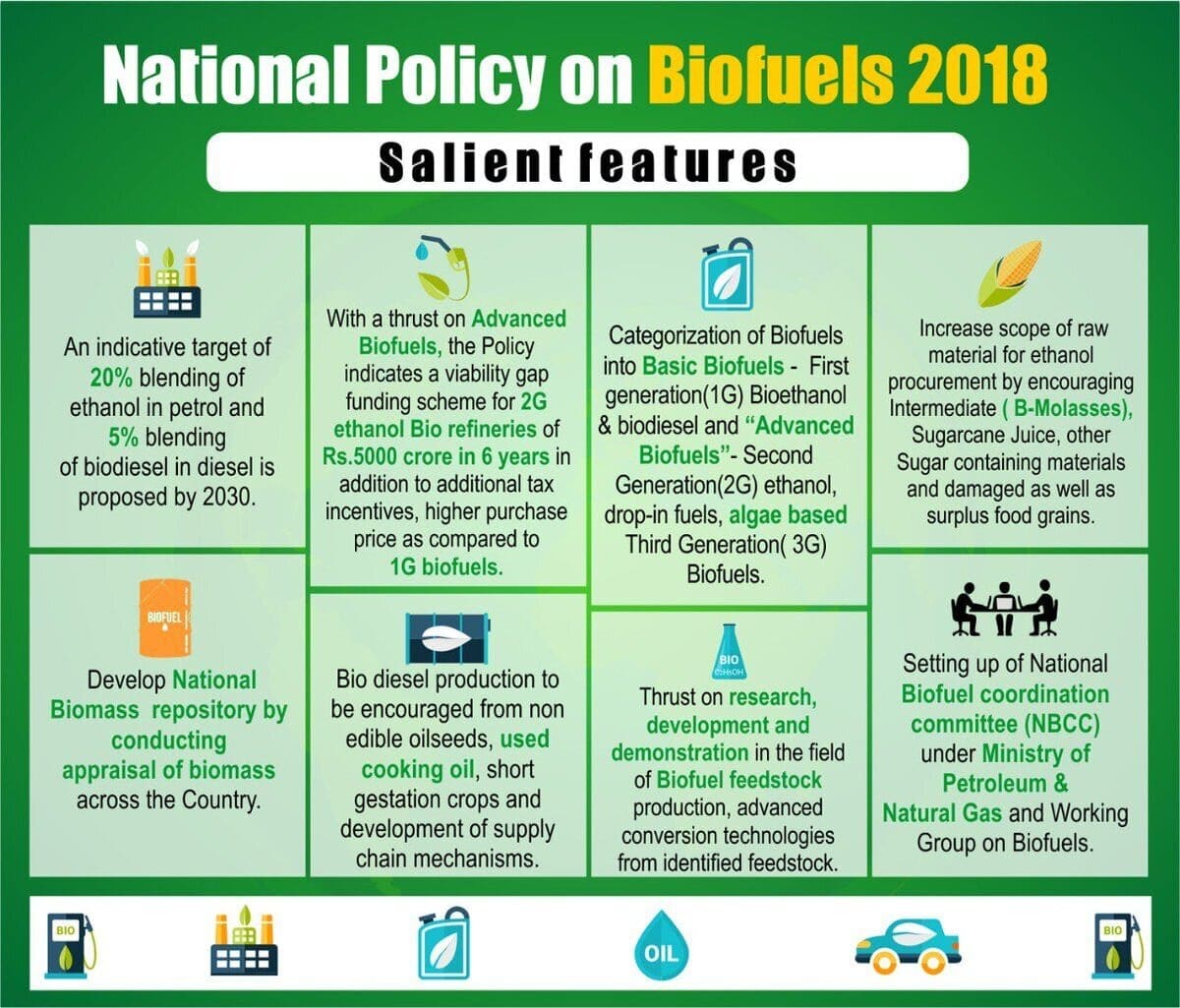Biofuel Day | 11 Aug 2020
Why in News
World Biofuel Day is observed on 10th August every year.
Key Points
- Theme for 2020: “Biofuels towards Atmanirbhar Bharat”.
- Objective: To create awareness about the importance of non-fossil fuels as an alternative to conventional fossil fuels and to highlight the various efforts made by the Government in the Biofuel sector.
- Celebrated by: Ministry of Petroleum and Natural Gas since 2015.
- Biofuels programme is also in synergy with Government of India’s initiative of Atmanirbhar Bharat.
Govt Initiatives to Promote Biofuels
- Biofuel: Any hydrocarbon fuel that is produced from an organic matter (living or once living material) in a short period of time (days, weeks, or even months) is considered a biofuel.
- Blending of biofuels: Ethanol Blended Petrol (EBP) programme, Administrative price mechanism for ethanol, Simplifying the procurement procedures by Oil Marketing Companies (OMCs), amending the provisions of Industries (Development & Regulation) Act, 1951 etc are some of the initiatives taken to promote blending of biofuels.
- Researchers at the International Centre for Genetic Engineering and Biotechnology (ICGEB) are developing a method to use cyanobacterium for biofuel production.
- Recently, the Central government has also allowed the conversion of surplus rice to ethanol.
- Initiatives by Department of Biotechnology, Ministry of Science and Technology:
- Development of 2G Ethanol and transfer of the technology to OMCs.
- Development of Indigenous Cellulolytic Enzyme for the production of biofuels.
- Strengthened the international collaboration to accelerate innovation in Sustainable Biofuel through multilateral programs like Atal Innovation Mission (AIM) and Biofuture Platform.
- Pradhan Mantri JI-VAN Yojana, 2019: The objective of the scheme is to create an ecosystem for setting up commercial projects and to boost Research and Development in 2G Ethanol sector
- GOBAR (Galvanizing Organic Bio-Agro Resources) DHAN scheme, 2018: It focuses on managing and converting cattle dung and solid waste in farms to useful compost,biogas and bio-CNG, thus keeping villages clean and increasing the income of rural households.
- It was launched under Swachh Bharat Mission (Gramin).
- Repurpose Used Cooking Oil (RUCO): It was launched by Food Safety and Standards Authority of India (FSSAI) aims for an ecosystem that will enable the collection and conversion of used cooking oil to biodiesel.
- National Policy on Biofuels, 2018:
- The Policy categorises biofuels as "Basic Biofuels" viz. First Generation (1G) bioethanol & biodiesel and "Advanced Biofuels"- Second Generation (2G) ethanol, Municipal Solid Waste (MSW) to drop-in fuels, Third Generation (3G) biofuels, bio-CNG etc. to enable extension of appropriate financial and fiscal incentives under each category.
- It expands the scope of raw material for ethanol production by allowing use of sugarcane juice, sugar containing materials like sugar beet, sweet sorghum, starch containing materials like corn, cassava, damaged food grains like wheat,broken rice, rotten potatoes, unfit for human consumption for ethanol production.
- The Policy allows use of surplus food grains for production of ethanol for blending with petrol with the approval of National Biofuel Coordination Committee.
- With a thrust on Advanced Biofuels, the Policy indicates a viability gap funding scheme for 2G ethanol Bio refineries of Rs. 5000 crore in 6 years in addition to additional tax incentives, higher purchase price as compared to 1G biofuels.
Way Forward
- Promotion of the use of biofuels in transportation in the countries like India will help in reducing the crude import bill.
- India being a large agricultural economy, there is a large amount of agricultural residues available, therefore the scope of producing Biofuels is immense in the country. Biofuels can help in rural and agricultural development in the form of new cash crops.
- Efforts for producing sustainable biofuels should be made by ensuring use of wastelands and municipal wastes that get generated in cities. A properly designed and implemented biofuel solution can provide both food and energy.
- A community-based biodiesel distribution programme that benefits local economies, from the farmers growing the feedstock to local businesses producing and distributing the fuel to the end consumer, will be a welcome step.

